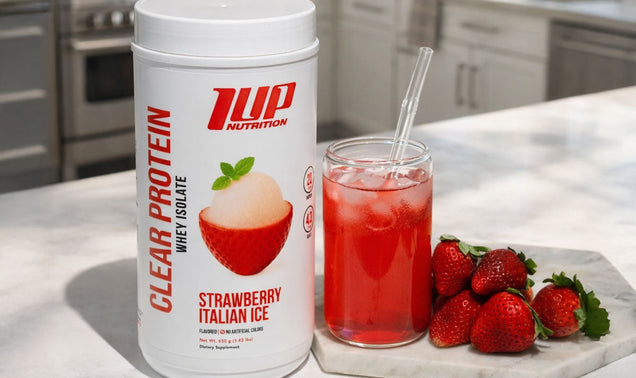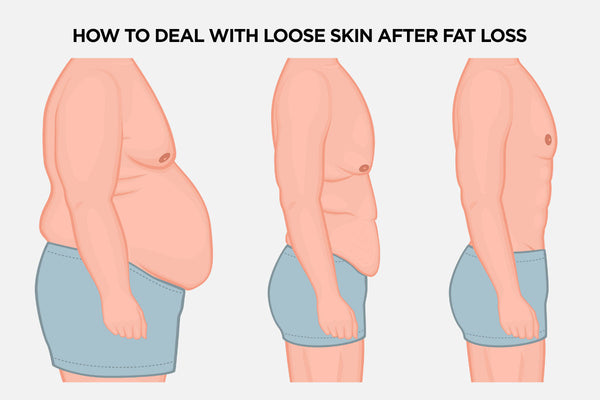Thousands of people have entered our transformation challenges with the goal of losing weight, building muscle, and improving their overall performance and physique.
And, while great results have been achieved, one thing that commonly happens following a successful transformation that isn’t always expected is loose skin.
In this article, we’ll cover why loose skin happens after weight loss as well as what you can to do deal with loose skin after fat loss.
Let’s get started.
What Causes Loose Skin After Fat Loss?
The skin is the largest organ on your body that serves both aesthetic, functional, and protective roles.
Like all other structures and organs of the body, the skin is formed from various proteins, namely collagen -- the body’s main structural protein.
Elastin is another important protein that contributes to the formation of skin. It provides elasticity to the skin and helps it stay tight.
As weight gain occurs, skin expands to accommodate this increase body mass (comprised of muscle and fat). Skin expansion also occurs during pregnancy, as the developing fetus grows over the course of 9 months.
When skin remains stretched for extensive amounts of time (such as being overweight or obese for many, many years), proteins in the skin become damaged, reducing their ability to shrink back down to their original size.
As a result of this damage to collagen and elastin, skin loses its elasticity and can remain loose following significant weight loss.
Interestingly, weight loss surgery may pose an even greater problem regarding loose skin than losing weight through a combination of diet and exercise. Research finds that individuals who undergo weight loss surgery produce less new collagen, and the quality of the collagen that is produced is inferior to that in healthy skin.[1,2]
4 Ways to Fix Loose Skin After Fat Loss
Perform Resistance Training
Regularly hitting the weights is paramount to achieving the body you want when trying to lose fat.
The reason for this is that muscle gives your body aesthetic curves, and helps you look better in your clothes.
It may also improve the appearance of loose skin following fat loss as the new muscle tissue will help fill out your physique (in a good way) and help prevent the skin from looking so loose.
Plus, the more muscle you have, the higher your metabolic rate will be as muscle tissue is highly active from a metabolic standpoint, which means it requires more energy to maintain compared to adipose (fat) tissue.
Use a Collagen Supplement
As we mentioned above, collagen is the main structural protein of the body and plays a prominent role in the quality and appearance of your skin.
Unfortunately, as we age our body’s ability to efficiently synthesize collagen on a daily basis declines.
One way to support collagen production is to consume foods rich in collagen such as bone broth.
Seeing as many individuals don’t routinely consume enough collagen-rich foods, collagen supplements have become incredibly popular.
Hydrolyzed collagen supplements have been shown in research to stimulate collagen production, improve dermal collagen strength, and confer protective (anti-aging) effects to the skin as well.[4,5]
In fact, a recent systematic review of collagen supplements concluded that oral collagen supplementation may be effective for increasing skin elasticity and hydration.[6]
1UP Hydrolyzed Collagen Peptides provides highly bioavailable grass-fed collagen peptides per serving.
Eat a Healthy Diet
It comes as no surprise that part of having great looking skin is a healthy diet.
Seeing as the skin is made of proteins like collagen and elastin, it stands to reason that consuming a higher protein diet supports healthy skin.
In particular, the amino acids that directly impact collagen synthesis are glycine, proline, and lysine. These amino acids can be found in countless protein sources, including 1UP Whey Protein.
But, protein isn’t all that’s important to healthy skin, essential vitamins, minerals, and antioxidants such as vitamin C, vitamin A, and vitamin E also play a role in the quality and appearance of your skin as they serve as important cofactors for the building and maintenance of collagen and elastin.[8]
Lastly, omega-3 fatty acids also have been found to promote skin health.
A 2018 review found that omega-3 fatty acids can protect skin from UV inflammation and damage, improve skin barrier function (which helps our skin keep out bad microbes), reduce dry skin, and accelerate skin wound healing.[9]
Omega-3 fatty acids are found abundantly in foods like salmon, mackerel, walnuts, and chia seeds.
To complement daily intake, many individuals also use omega-3 supplements.
1UP Omega-3 supplies 2 grams of high-strength fish oil in every serving.
Drink Enough Water
Our skin is made up of ~64% water.
What this means is that staying properly hydrated is crucial to the appearance and function of your skin.
Dehydrated skin can look dull, wrinkly, and loose, whereas a body that is well hydrated has a vibrant, tight look.
Moreover, research finds that individuals who increase their water intake demonstrate significantly better skin function and hydration.[7]
References
- Choo, S., Marti, G., Nastai, M., Mallalieu, J., & Shermak, M. A. (2010). Biomechanical properties of skin in massive weight loss patients. Obesity Surgery, 20(10), 1422–1428. https://doi.org/10.1007/s11695-010-0147-6
- Orpheu, S. C., Coltro, P. S., Scopel, G. P., Gomez, D. S., Rodrigues, C. J., Modolin, M. L. A., Ferreira, M. C. (2010). Collagen and elastic content of abdominal skin after surgical weight loss. Obesity Surgery, 20(4), 480–486. https://doi.org/10.1007/s11695-009-0019-0
- Ganceviciene R, Liakou AI, Theodoridis A, Makrantonaki E, Zouboulis CC. Skin anti-aging strategies. Dermatoendocrinol. 2012;4(3):308–319. doi:10.4161/derm.22804
- Asserin, J., Lati, E., Shioya, T., & Prawitt, J. (2015). The effect of oral collagen peptide supplementation on skin moisture and the dermal collagen network: evidence from an ex vivo model and randomized, placebo-controlled clinical trials. Journal of Cosmetic Dermatology, 14(4), 291–301.https://doi.org/10.1111/jocd.12174
- Figueres Juher, T., & Bases Perez, E. (2015). [An overview of the beneficial effects of hydrolysed collagen intake on joint and bone health and on skin ageing]. Nutricion hospitalaria, 32 Suppl 1, 62–66. https://doi.org/10.3305/nh.2015.32.sup1.9482
- Choi, F. D., Sung, C. T., Juhasz, M. L. W., & Mesinkovsk, N. A. (2019). Oral Collagen Supplementation: A Systematic Review of Dermatological Applications. Journal of Drugs in Dermatology : JDD, 18(1), 9–16.
- Palma L, Marques LT, Bujan J, Rodrigues LM. Dietary water affects human skin hydration and biomechanics. Clin Cosmet Investig Dermatol. 2015;8:413–421. Published 2015 Aug 3. doi:10.2147/CCID.S86822
- Catani, M. V., Savini, I., Rossi, A., Melino, G., & Avigliano, L. (2005). Biological role of vitamin C in keratinocytes. Nutrition Reviews, 63(3), 81–90. https://doi.org/10.1111/j.1753-4887.2005.tb00125.x
- Huang TH, Wang PW, Yang SC, Chou WL, Fang JY. Cosmetic and Therapeutic Applications of Fish Oil's Fatty Acids on the Skin. Mar Drugs. 2018;16(8):256. Published 2018 Jul 30. doi:10.3390/md16080256






